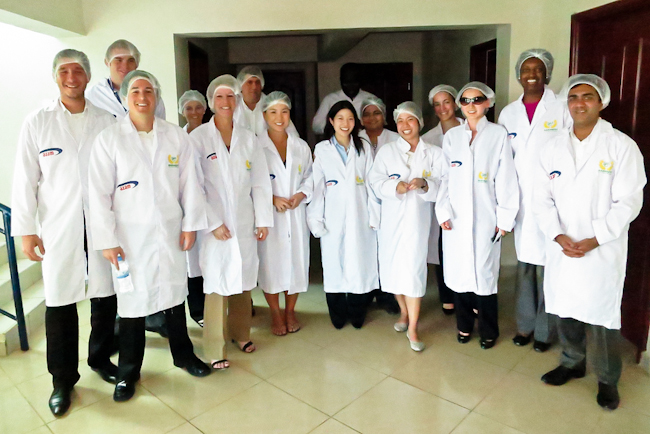
Wharton EMBA and MBA students prepare to tour a flour mill outside Kigali, Rwanda – flickr.com
Wharton was poised for a breakout year in 2016 – as far as the U.S. News rankings were concerned. Its incoming full-time class boasted its highest average GMATs, while its 2015 graduating class posted the school’s highest starting salaries ever. Despite a banner year, Wharton was knocked out of the “Big Three” by the University of Chicago (Booth) – even after besting or tying them in nearly every metric.
NYU STERN MAKES BIGGEST MOVE IN A RANKING THAT BARELY BUDGES
This same misfortune befell Wharton last year. After playing second fiddle to Wharton for several years, Booth snatched the top spot in U.S. News’ executive MBA ranking. It was an upset, no doubt, in this long-running rivalry. In the end, it turned out to be a fluke as Wharton reclaimed its #1 ranking in the 2017 EMBA rankings.
Indeed, it is business as usual in more ways than one with U.S. News. Every EMBA program ranked in last year’s top 10 stayed there. However, the order was shaken up a bit. Five top 10 programs exchanged spots, headed by New York University (Stern), which climbed from 7th to 5th, with Duke (Fuqua) falling two spots from 4th to 6th. Replacing Fuqua was Columbia Business School, which snuck into 4th. The University of California-Berkeley (Haas) and UCLA (Anderson) also flip-flopped the 8th and 9th spots respectively.

A Kellogg class of executive MBA students
At the same time, Northwestern (Kellogg), Michigan (Ross), and the University of North Carolina (Kenan-Flagler) retained their respective 3rd, 6th, and 10th spots. In fact, the U.S. News’ ranking, at least at the top, has remained suspiciously consistent over the past six rankings. The same 10 schools have squatted at roughly the same spots over that time. Fuqua, for example, ranked 4th for five consecutive years before finally slipping to 6th this year. Columbia has see-sawed between 4th and 5th during that same period. And Stern and Haas have consistently bounced between 6th and 7th and 9th and 10th spots respectively before finally breaking out of their lull this year. More than that, just one other EMBA program has ever broken into U.S. News’ top ten in the past six rankings: USC (Marshall) at 10th in the 2013 ranking.
SERIOUSLY FLAWED METHODOLOGY CALLS RESULTS INTO QUESTION
Sound like a cartel? Maybe. While the top 10 undoubtedly reflects excellence, the rankings are a by-product of a stale metric. For starters, executive MBAs are treated no different than business concentrations like finance and marketing in U.S. News’ ranking methodology. In other words, the rankings are based solely on survey s conducted with business school deans and directors of MBA programs (with U.S. News not even bothering to disclose the sample size or response rate specific to EMBAs). Here, respondents can nominate up to 10 schools as being excellent in a given area. To be eligible, schools must receive seven votes in a given area.
What’s wrong with that? Let us count the ways. For one, the ranking is a glorified popularity contest, a well-worn cycle where the same sample is tapped and ultimately provides the same results. Compare that to the intricacies and fluidity of the Financial Times’ EMBA ranking, where outputs like salary changes and career progress account for nearly half of the ranking. The Economist uses a similar approach, along with providing a forum for students themselves to voice the quality of faculty, curriculum, peers, and facilities (among other measurements).
Contrast that to U.S. News, which simply tallies votes. And that diminishes its ranking in two ways. First, the results don’t necessarily reveal the degree of passion that respondents may carry towards particular EMBA programs. For example, results might be entirely different if survey takers ranked the programs or assigned particular points to differentiate them.

Even more, the respondents themselves are unreliable indicators of a school’s quality. Notably, few deans or MBA directors have spent substantial time in other programs to gauge the quality of the students, instruction, network, and opportunities available to students. As a result, the ranking are susceptible to variables like reputation, chatter, and even bias.
Bottom line: U.S. News’ EMBA ranking is little more than a detached academic ranking. It doesn’t signal the market value of a particular program’s degree like an employer survey would. It also fails to measure long-term ROI metrics like salary that are covered by both The Economist and The Financial Times. It simply quantifies the reputation of a particular program from the vantage point of a subset of voters who are competing among themselves for talent.
U.S. NEWS EXCLUDES SEVERAL PROMINENT PROGRAMS
And such an approach leaves some gaping holes. The Yale School of Management, for example, doesn’t appear among the 23 EMBA programs ranked by U.S. News. Despite this, Yale somehow ranks 10th in The Economist’s more demanding metrics. Mind you, The Economist isn’t necessarily the perfect ranking. Texas Christian University (Neeley) and the University of Georgia (Terry) actually outrank prestige EMBA programs like Columbia, Ross, Stern, and Anderson there. And Wharton, Fuqua, Haas, and Kenan-Flagler don’t even appear among The Economist’s top 62 programs.
However, four American programs excluded from the U.S. News ranking actually finish in the top 40 for both the Financial Times and The Economist rankings: Arizona State University (Carey), Georgetown University (McDonough), the University of Maryland (Smith), and Rice University (Jones). In other words, the academic opinion featured in U.S. News’ EMBA ranking likely lags well behind the realities of the marketplace.
What’s more, U.S. News’ EMBA ranking is the only one among the Big Three (Bloomberg Businessweek dropped its EMBA ranking in 2015) to bar international programs. As a result, several prominent American partnerships, such as those between Columbia University and the London Business School and UCLA and the National University of Singapore, aren’t even part of the conversation. This turns the U.S. News’ EMBA ranking into a narrow, America-centric niche ranking. It neither reflects the global nature of the EMBA nor the leadership of schools like Kellogg in pioneering custom partnership programs in nations ranging from China to Germany to Canada.
(To see historical ranking, go to the next page)





Questions about this article? Email us or leave a comment below.